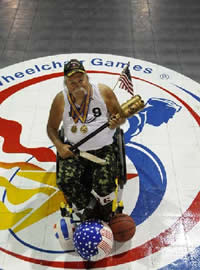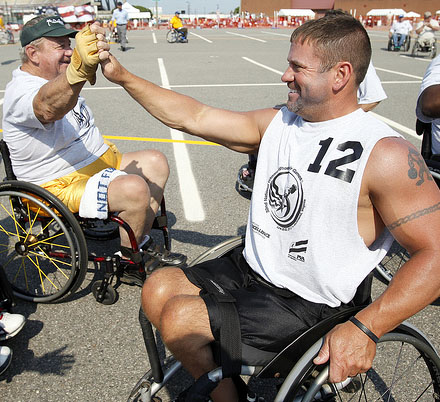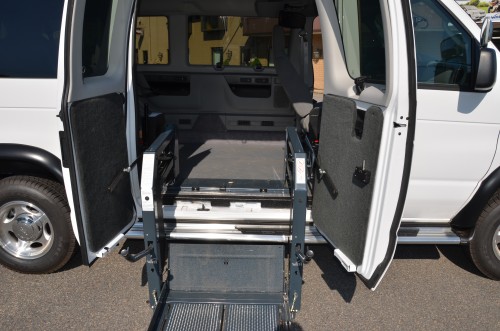
As a young boy growing up in rural Wisconsin, Phillip Rosenberg, 62, was surrounded by heroes. His father and three uncles had served in World War II. One uncle was shot down over the English Channel. His father fought in the Battle of the Bulge.
“It seemed like every adult male had served,” said Rosenberg, a native of Pulaski, Wis., a town of 5,000 people best known for “Pulaski Polka Days”, one of the largest festivals dedicated to the Polish in the United States. “When I came of age, it was just my turn, so I enlisted.”
Serving in the 1960’s almost certainly meant an all-expenses paid trip to Vietnam. Arriving in 1969, Rosenberg served with the famed 82nd Airborne Division located at Phu Loi and the 9th Infantry Division located at Dong Tam. Midway through the tour, he was wounded and received the Purple Heart.
“I got knocked over by a blast wall,” remembered Rosenberg. “Somehow three of my fingers got severed. I picked ‘em up, put ‘em in my pocket and hustled over to the medic. Later, they re-attached my fingers.”
Injured, Rosenberg returned home in 1970 to a country that was eager to get out of Vietnam.
“It was not a very receptive society,” he said.
He enrolled at the University of Wisconsin-Milwaukee (UWM) and played for the baseball team. Then in 1974, his life changed forever.
“October 2,” said Rosenberg. “A car accident. I spent 18 months in rehab at the Milwaukee VA.”
After physical therapy, Rosenberg gradually learned to re-adjust to his altered life. Bit by bit, a new sense of purpose arose. Then…a mission redefined.
From Injured to Active
“I was a three-sport athlete, served my country and I was just sitting around,” he said. “I deserved better for myself, we deserved better from our country.”
Rosenberg got involved with the Paralyzed Veterans of America (PVA) and started advocating for wheelchair accessibility and parking. He got back into school. He started making things happen. In the fall of 1979, he, along with three other Veterans, founded the Wisconsin Chapter of the PVA, a chapter in which he serves as President today.
“Disabled Veterans had a lot of needs,” said Rosenberg. “So we got to work.”
Graduating Magna Cum Laude from UWM in 1982, he launched a career in teaching in what he thought would be his life’s work, but his mission was redefined again.
“1982 was also the first year I attended the Wheelchair Games,” said Rosenberg. “They were in Milwaukee and with the encouragement of Dr. Atzla Gahatit, Chief of Spinal Cord Surgery and Don Schmitt from PVA, I decided to go. They were really pushing us guys to go. I’m glad they did because a whole new world opened up.”
Still a Competitor
A year later, Rosenberg left teaching and became a Vocational Rehabilitation Counselor for the Clement Zablocki VA Medical Center in Milwaukee, Wis. It was a mission that lasted for the next 26 years, almost as long as his attendance streak at the Wheelchair Games.
“I’ve gone to 31 consecutive Games missing only the first one here in Richmond in ‘81,” said Rosenberg. “It’s amazing to think back on all of the lives these Games have helped. I am so honored to have been a part of it.”
Over the years, he has participated in nearly every event the Games have offered. Softball? It’s one of his favorites in the early years. Trap shooting? He was afraid he would go head over heels the first time, yet to this day he still travels the PVA trap shooting circuit. Quad Rugby? It’s built for his competitiveness.
“I tell the young guys, if me, at 62, and Bull, at 65, can still do it, so can you,” said Rosenberg referring to last year’s Spirit of the Games recipient, Jerry “Bull” Baylor. “I wish they had the event when I was younger though.”
Baylor first met Rosenberg at the ’82 Games in Milwaukee. He added “Like Phil, I’m a fierce competitor and we’re two of the oldest around playing Quad Rugby. I think it’s a testament to the healing power of these Games that we’re still so competitive after 30 years.”
Healing power, competitiveness and drive. These are some of the very attributes to live a full and happy life, reminds Rosenberg. It’s a message he wants to share with his brothers and sisters returning from overseas or those Veterans who have suffered a catastrophic injury.
“If you think your life is over, it will be,” said Rosenberg with his jaw set firm. “The Games are a teaching mechanism, not only with sports, but with life. You’ve got to build that first level of independence. Set goals for the future. Gain confidence and you will do anything you want to do.”
After 31 years coming to the Games and now three years into retirement, you might think that Phil Rosenberg is going to slow down a bit. Well, think again.
“There’s too much I still want to do,” he exclaimed. “I’m getting ready to hit the road, travel to Europe. I want to see all 50 states, all the parks and monuments this country has to offer. I don’t know if I’m gonna have time to pack it all in, but I’m gonna try!”
Phillip Rosenberg. Mentor. Advocate. Competitor.





